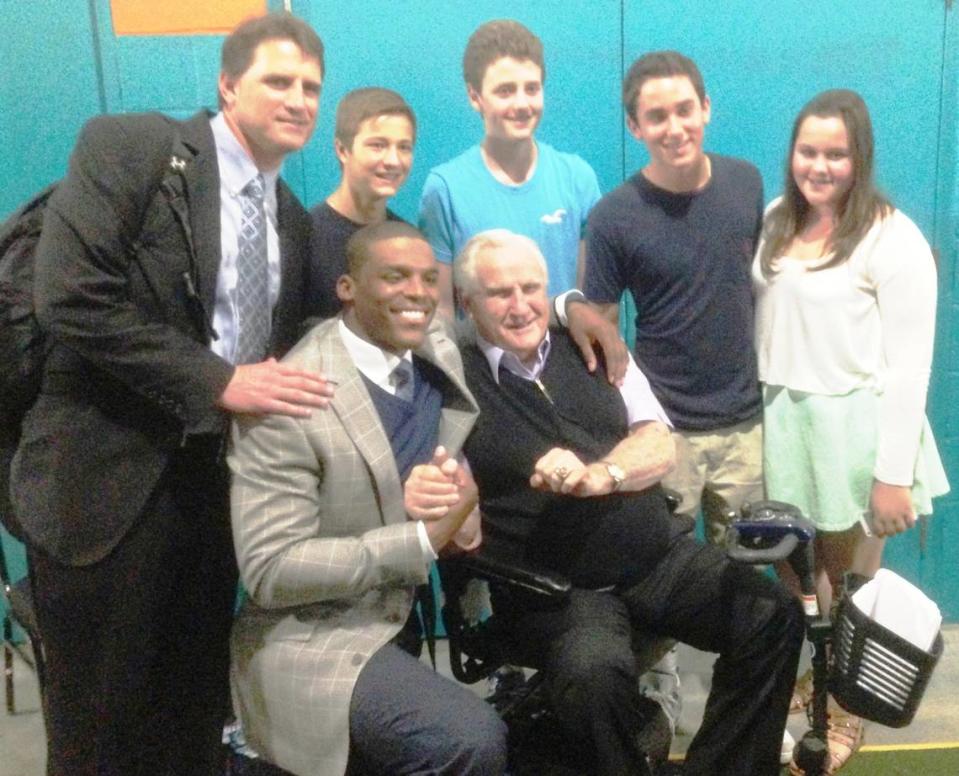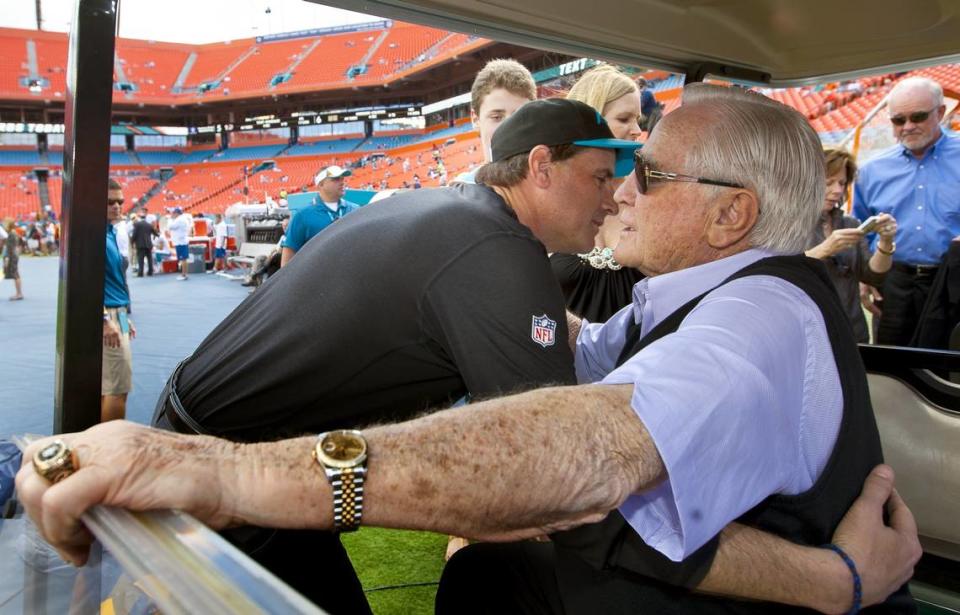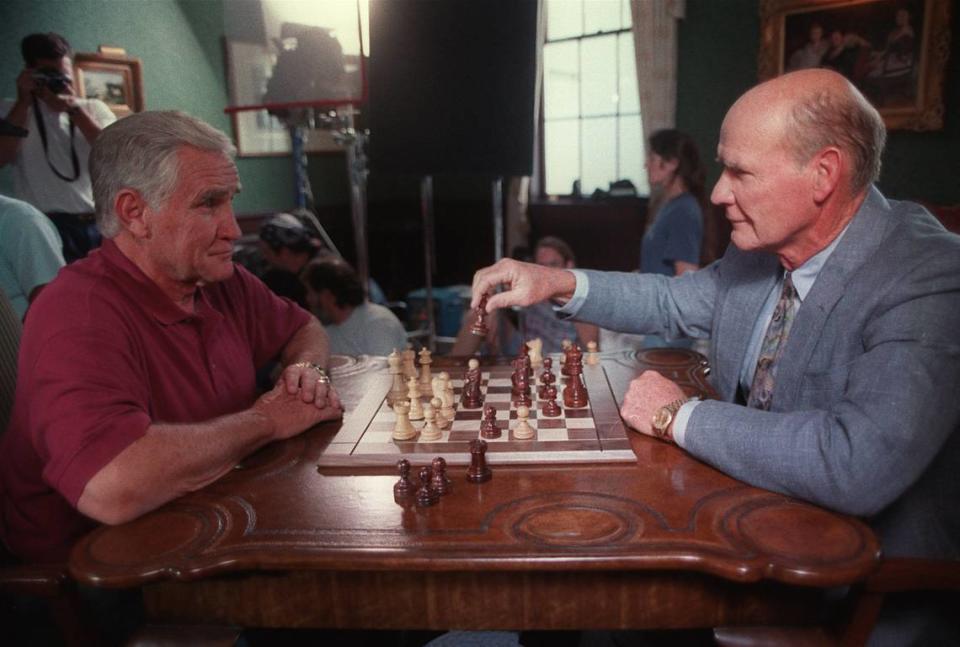The Don Shula I knew: An intimidating NFL coach, a proud father, a kind man
In 1992, when I was 27 years old, I worked at the Miami Herald and covered the Dolphins and their legendary coach, Don Shula.
Each weekday morning, I would drive on the Don Shula Expressway and pass Don Shula’s steakhouse and Don Shula’s hotel. Then I would get to the Dolphins’ practice facility, where I would interview Don Shula.
Shula died Monday at age 90. The Dolphins issued a statement saying the NFL’s winningest all-time coach had died “peacefully at his home.”
In 1992, when I first got to know Shula, he was 62 — intimidating, gruff, funny and completely consumed with football.
I was intimidated by him at first, but grew to like him. By then, Shula had already won two Super Bowls and was the author of the Dolphins’ perfect 17-0 season of 1972, which has still never been duplicated.
It is a common misconception that Shula never wanted another NFL team to go undefeated so that his Dolphins could stand alone on the undefeated mountaintop. In the middle of the 2015 season, he told me he would love for the Carolina Panthers to go 19-0 and surpass the Dolphins (his son, Mike Shula, was the Panthers’ offensive coordinator at the time).
But in 1992, Shula didn’t try to lord his accomplishments over a reporter 35 years younger than he was. He answered my questions thoughtfully. He gave me his home phone number and said he’d appreciate if — when I was about to write something controversial — that I gave him a chance to explain his side of it.
I always did that, but it didn’t always work out. Shula and quarterback Dan Marino had been together a decade by the time I got to cover them. Shula was sensitive to the fact that he had a Hall of Fame quarterback on his roster but wasn’t able to put a good enough team around him to could win another Super Bowl.
When I wrote a story chronicling a few small missteps in the coach-quarterback relationship, Shula called me aside the next day, lined his famous jaw up a few inches away from mine and yelled at me for 10 minutes.
When he paused for breath, I tried to explain. “But coach…” I started.
Shula walked away then, waving a hand at me as he left, not wanting to hear it. I understood then one of Shula’s well-known quotes: “I don’t get ulcers. I give them.”
Shula also never brought that story up again to me and didn’t hold a grudge about it. He moved on, just like he moved on from the grind-it-out Larry Csonka teams of the 1970s to the pass-first Marino teams of the 1980s. He won 347 games as an NFL head coach, more than anybody else, in part by being much more flexible than that jaw would suggest.

“If a nuclear bomb were to be dropped, the only two things I’d bet would survive would be Astro Turf and Don Shula,” Bubba Smith, who played under Shula with the Baltimore Colts, said once.
Shula and ‘Miami Vice’
Shula was often clueless about things that didn’t matter to his football team. People around him loved to tell the story of the time that actor Don Johnson came to one of the Dolphins’ practices at the height of his “Miami Vice” fame in the late 1980s.
Johnson, at the time, had briefly eclipsed Shula in name recognition in South Florida. But when Johnson asked Shula at the practice to “come watch ‘Miami Vice’ shoot sometime,” Shula thought Johnson was an actual cop. He wondered aloud to a friend why anyone would think he would want to go watch a police officer take target practice.
Shula had an ego, for sure. And especially as a young coach, he could be harsh. Players sometime joked that Shula had a great tolerance for pain, especially when it was other people’s pain. Early in his career, he didn’t like his players drinking water in practice (this was common among coaches at the time).
But he would tell self-deprecating stories about himself, too. He told me one once about the time he and his first wife, Dorothy, walked into a movie theater while on vacation in Maine not too long after the 17-0 season landed Shula on the cover of Time magazine.

There weren’t many people in the theater, but they all started applauding when the Shulas walked inside. Shula laughed. “They even know me here!” he told his wife.
In reality, the theater manager had told the crowd a few minutes before he would only show the movie if there was a crowd of at least 15 people. The Shulas had made it 15.
By 1994, I moved on, too, to Charlotte to cover the Panthers, where I’ve been ever since. I was covering the NBA’s Miami Heat by then and didn’t tell many people I was changing jobs. Shula found out anyway, autographed a football and had it sent to me. I keep very little memorabilia around, but that football is sitting on my desk as I write this.
Shula’s N.C. connections
Shula long had a soft spot for North Carolina. The extended family would often escape Miami’s fierce summers for a week or two each year by gathering in the N.C. mountains. “You ever been to that place called Tweetsie Railroad?” Shula asked me once I had moved to Charlotte. “We love to take the grandkids there.”
Late in his life, Don Shula developed a direct connection with the Panthers due to his son Mike Shula, who was an assistant coach for Carolina from 2011-17 and its offensive coordinator under head coach Ron Rivera for five years.
“Mike is calm and cool,” Shula told me once. “Not hot-headed like the old man.”
The elder Shula said that when he was 85 — in 2015, the last time we spoke at length. A long-time multi-tasker, Shula did the interview by phone while also working out with a physical therapist who, Shula grumbled, “is beating the hell out of me.”
It was in that interview that Shula said he hoped the Panthers — who were 8-0 at the time — would end up 19-0 and surpass the Dolphins’ 17-0 season of 1972.
“That would make me so proud if that happened,” Shula said. “I’d love to see the Panthers do it. I’m rooting them on, that’s for sure.”
We know how that turned out. The Panthers got to 14-0 before losing to Atlanta, and then lost again in the Super Bowl to the Broncos. Mike Shula eventually was fired by Ron Rivera after the 2017 season and now is the quarterbacks coach in Denver.

A name that would be famous
Don Shula was a legend for 50-plus years and won an NFL-record 347 games. It’s impossible for most sports fans to remember a time when his name wasn’t instantly recognizable.
But once, in 1993, I went to Ohio for several days for a story to find out what he had been like as an unknown kid.
It turned out that in the 1930s and 40s, he wasn’t even the most well-known child in his own family — that honor went to the Shula triplets, who were born six years after older brother Don.
Triplets were such a novelty back then that they were often chronicled in the local paper, with jaunty headlines like “Shula triplets celebrate second birthday” and “Shula triplets, 5, have a party.”
Don was the older brother, overshadowed at the time but driven to succeed. Once one of the triplets, Jeannette, was sitting at the Shulas’ kitchen table. She was in second grade; Don was in the ninth. She was writing her name over and over in cursive.
“What are you doing?” Don asked.
“Practicing my autograph so I’ll have a good one when I’m famous,” she replied.
Shula took the paper away from Jeannette and scribbled Don Shula on it, just once.
“That,” he said, pointing at the paper, “is the name that is always going to be famous.”

